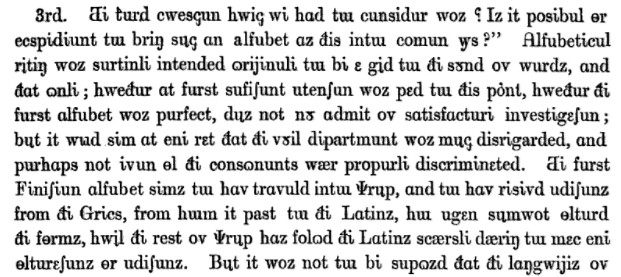
Philologist Alexander John Ellis wanted to describe the sounds made by every human speaker, and to record them as objectively as possible in a universal alphabet, so that anyone could accurately record speech in any language. He acknowledged that “it would be impossible to make the whole world pronounce alike,” but he thought that the system illustrated above could be a step toward “a just, philosophical, and natural analysis and arrangement of spoken sounds.”
The passage runs:
The third question that we had to consider was: is it possible or expedient to bring such an alphabet as this into common use? Alphabetical writing was certainly intended originally to be a guide to the sound of words, and that only; whether at first sufficient attention was paid to this point, whether the first alphabet was perfect, does not now admit of satisfactory investigation; but it would seem at any rate that the vowel department was much disregarded, and perhaps not even all the consonants were properly discriminated. …
Beyond its practical value, Ellis seemed to hope that recording language phonetically would reduce its cultural connotations, resulting in a more just world. “Ellis believes that his ‘alphabet of nature’ would in fact free letters from implying a particular world view, a theory supremely indicative of a nineteenth-century faith in objective science,” writes Laurence de Looze in The Letter & the Cosmos. “The utopian drive of universal communication peeks through the modern, scientific program.”
